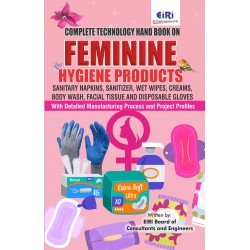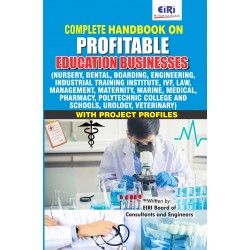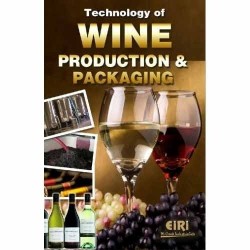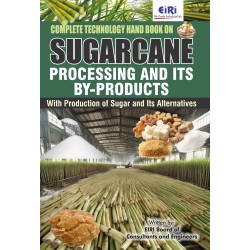Top 5 Most Profitable Ventures - Newly Published Technology Books

In the world of entrepreneurship, knowledge is power. Understanding the intricacies of various industries and having access to comprehensive handbooks can be the key to unlocking success in your business endeavors. Whether you're venturing into sugarcane processing, wine production, education businesses, pipe and tube manufacturing, or feminine hygiene products, having the right resources at your disposal is crucial. In this article, we'll explore five essential handbooks that provide valuable insights, project profiles, and detailed manufacturing processes for these diverse industries.
Sugarcane Processing
For those interested in the sugar industry, this handbook is a treasure trove of information. From understanding the process of sugarcane processing to exploring alternative sugar production methods, this comprehensive guide covers it all. Learn about the production of sugar and its by-products, along with detailed project profiles to kickstart your venture in this lucrative industry.
Sugarcane processing yields three primary by-products: bagasse, molasses, and filter muds, each with diverse applications driven by economic considerations.
Bagasse:
- Bagasse is the residual fiber remaining after extracting juice from sugarcane, widely utilized for electricity generation due to its renewable energy potential.
- It serves as an alternative raw material for paper production, offering a sustainable option to wood pulp.
- Bagasse finds application in particleboard manufacturing, known as chipboard, contributing to eco-friendly construction materials.
- Additionally, bagasse yields furfural, a flammable chemical, and methane gas, showcasing its versatility in energy production.
- Efforts are underway to explore bagasse's potential for packaging material and its use as cattle feed, highlighting its multifaceted utility.
Molasses:
- A vital by-product of sugar production, molasses is increasingly valuable for ethanol production, potentially diverting sugarcane processing entirely towards ethanol generation.
- Ethanol, blended with petroleum, serves as an eco-friendly fuel, with anticipated growth in its percentage in petrol in the foreseeable future.
- Molasses, the residual syrup after sucrose extraction, is a precursor for acetic acid, yeast, ethanol, and Rum production, expanding its applications beyond fuel.
Filter Mud:
- Filter mud, the residue from juice filtration, presents opportunities for fertilizer production due to its nitrogen content.
- Refined wax derived from filter mud, rich in fatty acids and lipids, offers potential applications in various industries.
- Additionally, filter mud serves as cattle feed, contributing to agricultural sustainability and waste reduction initiatives.
Wine Production & Packaging
Wine enthusiasts and aspiring vintners alike will find this handbook invaluable. Dive into the world of wine production, from grape cultivation to fermentation techniques and bottling processes. Discover the art and science behind wine packaging and learn how to create your own signature blends with the help of expert insights and project profiles.
The global wine market has seen a significant shift in consumer behavior, with a notable surge in online purchases due to the closure of traditional on-trade channels. However, off-trade channels experienced growth across all price points. As quarantine restrictions ease and online shopping becomes more prevalent, the wine market is expected to regain its momentum.
Social factors, modernization, and the adoption of Western culture have contributed to the increased consumption of wine, making it a symbol of social status. Low alcoholic beverages are gaining popularity, particularly among millennials and young adults, for their refreshing taste and lower alcohol by volume (ABV). These beverages are increasingly associated with various occasions and are becoming a staple drink with everyday meals in developing countries, driving demand and prompting manufacturers to innovate.
The wine packaging market has also witnessed robust growth, driven by concerns about packaging safety and the growing preference for eco-friendly solutions. With consumers becoming more health-conscious and having greater disposable income, the demand for wine is expected to rise. This trend has led to an increase in online wine sales, necessitating premium packaging for transportation. Additionally, there is growing demand for single-serving wine containers, contributing to market expansion.
Sustainability is a key focus in the wine packaging industry, driven by environmental concerns and consumer preferences. Sustainable packaging solutions, such as recyclable materials and corrugated boxes, are gaining traction. Leading packaging companies are collaborating to introduce innovative and eco-friendly packaging solutions, further fueling market growth. As the industry continues to prioritize sustainability and innovation, the wine packaging market is poised for significant expansion in the coming years.
Profitable Education Businesses
Education is not just a noble pursuit but also a profitable business venture when done right. This handbook covers a wide range of educational businesses, including nursery schools, dental clinics, boarding schools, engineering institutes, and more. Explore detailed project profiles and gain valuable insights into the management, operations, and profitability of various educational ventures.
These businesses operate in various sectors, catering to different age groups, industries, and specialized fields of study. Here's an explanation of each segment mentioned:
- Nursery: Nursery schools or early childhood education centers cater to the educational needs of young children, typically between the ages of three and five years old. These establishments focus on providing a nurturing and stimulating environment for early learning and development.
- Dental: Dental education businesses may include dental schools, training centers, or continuing education programs for dental professionals. These institutions offer comprehensive training in dentistry, including clinical practice, research, and specialized dental procedures.
- Boarding: Boarding schools provide full-time residential education and accommodation for students. These institutions offer a structured academic curriculum along with extracurricular activities, fostering holistic development and personal growth.
- Engineering: Engineering education businesses offer degree programs, vocational training, or professional development courses in various engineering disciplines. These programs equip students with the knowledge and skills needed to pursue careers in engineering fields such as civil, mechanical, electrical, and computer engineering.
- Industrial Training Institute (ITI): ITIs offer vocational training programs in a wide range of trades and skills, including welding, plumbing, carpentry, electronics, and automotive mechanics. These programs prepare students for employment in industries and trades that require specific technical skills.
- IVF (In Vitro Fertilization): IVF education businesses may include fertility clinics, reproductive medicine centers, or training programs for fertility specialists. These institutions offer education and training in assisted reproductive technologies, infertility treatments, and reproductive endocrinology.
- Law: Legal education businesses encompass law schools, bar exam preparation courses, and continuing legal education programs for practicing attorneys. These institutions provide comprehensive training in various areas of law, legal research, and advocacy skills.
- Management: Management education businesses offer degree programs, executive education courses, and professional development workshops in business administration, management, and leadership. These programs prepare individuals for careers in business, entrepreneurship, and corporate management.
- Maternity: Maternity education businesses provide prenatal classes, childbirth education programs, and lactation consulting services for expectant mothers and families. These services aim to educate and support individuals throughout the pregnancy, childbirth, and postpartum journey.
- Medical: Medical education businesses include medical schools, residency programs, and continuing medical education courses for healthcare professionals. These institutions provide comprehensive training in medicine, surgery, and healthcare delivery, preparing students for careers as physicians, surgeons, and healthcare specialists.
- Pharmacy: Pharmacy education businesses offer degree programs, pharmacy technician training, and continuing education courses for pharmacists and pharmacy professionals. These programs cover topics such as pharmaceutical sciences, pharmacology, and medication therapy management.
- Schools: Educational businesses in the school sector encompass primary schools, secondary schools, and high schools offering K-12 education. These institutions provide a structured academic curriculum, extracurricular activities, and support services to students of varying ages and grade levels.
- Veterinary: Veterinary education businesses include veterinary schools, training programs, and continuing education courses for veterinarians and veterinary technicians. These programs cover topics such as animal anatomy, physiology, pathology, and veterinary medicine.
Overall, profitable education businesses in these sectors offer valuable educational services, training, and support to individuals seeking to acquire knowledge, skills, and credentials for personal and professional advancement.
Pipes And Tubes Manufacturing
The pipes and tubes industry is a cornerstone of modern infrastructure development. Whether you're involved in construction, manufacturing, or plumbing, this handbook offers comprehensive coverage of pipes and tubes' mechanics, manufacturing processes, and applications. With detailed project profiles, you'll be equipped to navigate this essential industry with confidence.
The global pipes market, valued at $119.5 billion in 2023, is expected to reach $209.1 billion by 2032, with a compound annual growth rate (CAGR) of 4.5% from 2023 to 2032. Pipes, characterized by their round cross-sectional hollow tubes, serve as crucial conduits for the transportation of liquids, gases, and other fluids. They are manufactured from various materials, including plastic, metal, concrete, and composite materials. Plastic pipes commonly feature Polyvinyl Chloride (PVC) and high-density polymer ethene (HDPE), while metal pipes are crafted from stainless steel, carbon steel, alloy steel, copper, aluminum, among others.
The pipes market is driven by several factors, including the construction of new residential and commercial buildings, the establishment of water supply pipelines, the expansion of wastewater treatment facilities, and the development of public agriculture irrigation systems in emerging economies. Additionally, the growth of industrial facilities across sectors such as food and beverages, chemicals and petrochemicals, pharmaceuticals, and other industries globally contributes to the positive momentum of the pipes market.
Pipes play a vital role in both industrial and non-industrial sectors, facilitating the conveyance of various substances, including liquid, gas, and amorphous solids. In non-industrial applications, pipes are utilized for supplying wastewater to municipal treatment plants, public sewage systems, community water pumps, gas pipelines, irrigation pipelines, residential plumbing, HVAC systems in buildings, and other purposes. Their versatility and widespread usage across different sectors underscore the indispensable nature of pipes in modern infrastructure and everyday life.
Feminine Hygiene Products Manufacturing
In today's health-conscious world, feminine hygiene products are in high demand. This handbook provides detailed insights into the manufacturing processes of sanitary napkins, sanitizers, wet wipes, and more. Explore the intricacies of product development, quality control, and market trends to carve out a niche in this growing industry.
The feminine hygiene market has demonstrated consistent growth over the study period and is poised to maintain this upward trajectory in the forecast period. Feminine hygiene products play a crucial role in managing menstrual flow, providing women with security and comfort during their periods. These products not only prevent leaks but also enable women to carry out their daily activities with confidence. Moreover, they contribute to enhanced hygiene by reducing the risk of infections or discomfort, particularly during menstruation, thereby promoting women's overall physical and emotional well-being.
The expansion of the female population, combined with rapid urbanization, significantly influences the feminine hygiene products market. As more women migrate to urban areas and attain higher levels of education, their awareness and purchasing power increase, driving up the demand for feminine hygiene products. This demographic shift underscores the importance of accessibility and affordability of these products to cater to the diverse needs of women in urban settings.
There is a noticeable global trend towards sustainability and environmental consciousness, particularly concerning menstrual products. Consumers are increasingly mindful of the ecological impact of disposable menstrual products, which contribute to significant waste generation. As a result, eco-friendly alternatives such as reusable menstrual cups, cloth pads, and biodegradable tampons are gaining popularity. These sustainable options address environmental concerns by reducing waste and carbon footprint, presenting appealing choices for environmentally-conscious consumers and driving market growth.
With access to these five essential handbooks, entrepreneurs have the knowledge and resources they need to succeed in diverse industries. Whether you're interested in sugarcane processing, wine production, education businesses, pipe and tube manufacturing, or feminine hygiene products, these guides offer invaluable insights and project profiles to guide you on your entrepreneurial journey. Equip yourself with the right tools and information, and watch your business thrive in today's competitive market landscape.















